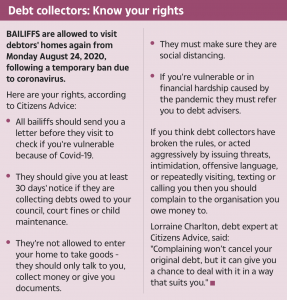Bailiffs are now able to approach debtors’ homes over repayments for fines, traffic offences, unpaid council tax and other outstanding penalties.
The guidance, which has been published by the Ministry of Justice, outlines that goods can still be seized during the pandemic.
But the procedure of bailiffs coming to visit people’s homes is now different from before as there are several rules that they must follow.
1. Bailiffs must socially distance
Enforcement officers have to make “every reasonable effort to maintain social distancing”, so two metres or one metre apart where two metres isn’t possible, during their visits.
They also need to assess the risks of going into the property they’re visiting and work out a way to make the visit in the most socially-distant way possible.
It’s similar to the risk assessments shops, bars and pubs had to follow before they reopened and the agents need to do it as they arrive at each property.
During the visit, they also have to:
• Maintain social distancing as far as possible
• Minimise contact with other people in the property they’re visiting
• Minimise physical contact with surfaces and objects
• They could ask the owner of the house to leave doors open to help airflow
• They should also try and keep interactions to well ventilated areas in the property
• Wash or disinfect their hands regularly
2. Leave if someone breaks social distancing or appears to have coronavirus
If someone “deliberately” attempts to breach social distancing or endangers the safety of themselves or the bailiff during the visit, the bailiff has to leave, under the new guidance.
They also should report it to the police, if it’s appropriate to do so, but they will also keep a record of it.
3. Bailiffs need to wear PPE
Like going on public transport, bailiffs need to wear a face mask during visits, especially where social distancing will be difficult.
They could be wearing some or all of the items below:
• Fluid repellent surgical face masks
• Eye protection (such as face visor or goggles)
• Disposable gloves
They also always need to have hand sanitiser with them at all times and try not to touch any surfaces.
Once the visit is finished, they need to dispose of their PPE and also wash or sanitise their hands.
Face masks and gloves need to be removed, put into a sealed bag and then binned.
But eye goggles can be reused.
4. People need to be contacted before they’re visited at home
The Ministry of Justice has said that bailiffs have to try and contact people before visiting their homes to check and see if anyone is self isolating or has got Covid-19 symptoms.
This can either be on the phone, a text message, a letter or by email.
If so, they will return at a later date.
If bailiffs arrive and find someone is displaying Covid-19 symptoms, they will leave and return at a later date, which will be after the shielding period is over.
They’re also not allowed to try and get people to make or agree topayments if someone is ill, but they can tell them when they’re coming back.

